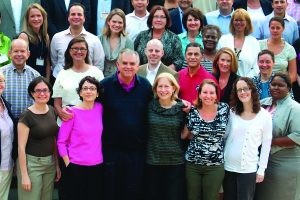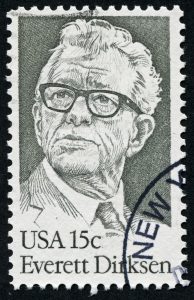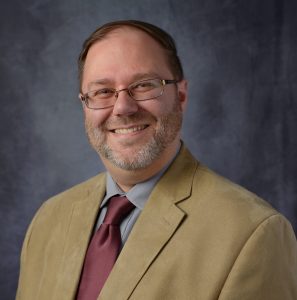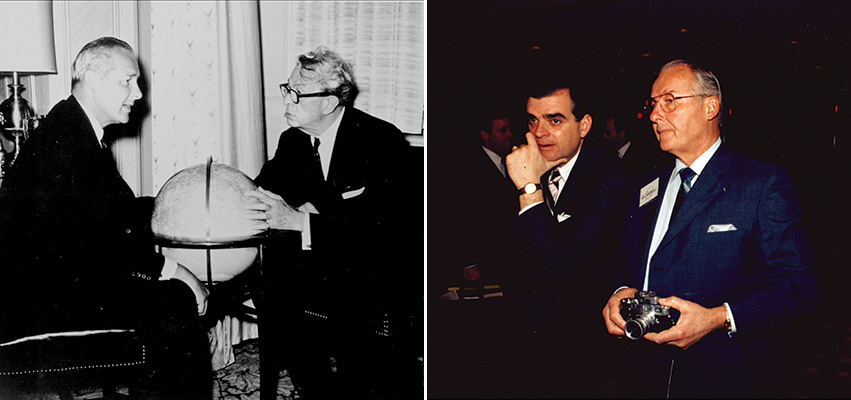Some of the most prominent public servants central Illinois has sent to the national stage have left footprints for future leaders to follow.
‘if you want to lead, you’d better be listening 90 percent of the time’
— Bob Michel
Everett Dirksen, Bob Michel and Ray LaHood collectively represented the Peoria area for more than 75 years in the nation’s capital. During that time, they earned a reputation for listening, being open-minded, being civil in debate, and mentoring a new generation of leaders – skills that are a template for success in many fields.
While a good leader may inspire others, a willingness to remain silent and attentive can truly set them apart. Quoting advice from his father, Michel habitually said that “if you want to lead, you’d better be listening 90 percent of the time.”
Why was listening so important to the longtime member of Congress?
“You lead by listening because when you are listening to others you are finding out the facts. And you can’t lead without the facts to help you make decisions,” Michel told Pekin Community High School students in 1984.
After getting new facts, leaders also are willing to rethink their decisions, and are unafraid to change their minds or work to bring differing sides together through compromise. Indeed, Dirksen was well known for doing this and it’s intertwined with his reputation for passing key measures, including the Civil Rights Act of 1964. He’d often emphasize that willingness: “I am a man of fixed and unbending principles, the first of which is to be flexible at all times.”
‘I am a man of fixed and unbending principles, the first of which is to be flexible at all times’
— Everett Dirksen
Each of them was also a champion of decency and civility — qualities that aren’t just contained to public life, but all discourse.

of Transportation in 2010
As a local newspaper editorial observed of Dirksen days after his death in 1969, “he was a man of good will. He was never vindictive even with those who gave him vicious provocation. … He could take it. He didn’t bother to dish it out.”
Michel famously preached that “raising the level of your voice doesn’t raise the level of discussion. You know that listening with care is better than talking in sound bites and thinking in slogans. You know that peaks of uncommon progress can be reached by paths of common courtesy.”
The comity they modeled is, often as not, replicated here at the local level. Generations of state lawmakers have crossed party lines to work together for the Peoria region, and the decency and respect shown to fellow members is the rule rather than the exception on our city councils and school boards. We know, sadly, that’s not always the case elsewhere.

Over generations, this trio also mentored countless future leaders, enriching the landscapes of our companies and not-for-profits in central Illinois and beyond.
As a young congressman, Michel was taken under Dirksen’s wing, repeatedly recalling his mentorship in later years. Michel then mentored a new generation of public servants, including eventual successor Ray LaHood, who recalls him as a teacher: “His classrooms were his office, the floor of the House, its committee rooms, and the farms and towns of the 18th District. Everywhere he went, he taught us by his example what it meant to be a public servant in the truest sense of that phrase.”

LaHood then imparted those lessons on a generation of staff and interns as the wheel continued to turn.
Mentoring isn’t always about molding a successor. It’s about helping others more broadly.
When LaHood arrived in Washington, D.C., as a congressman, he began to visit a local elementary school on Tuesdays at noon to read with pre-teens. Over the course of 14 years, he continued that practice. One of the young women he had read to had remembered what she learned and went out of her way at age 21, more than a decade after she’d last seen him, to let him know what it meant to her.
“You have no idea what influence mentoring can have. That’s why mentoring is so important,” LaHood wrote in his memoir.
‘You have no idea what influence mentoring can have … it’s so important’
— Ray LaHood
Such skills remind us why these public servants are still celebrated and honored across central Illinois today, and why so many leaders and public servants still seek to follow their examples.
The Dirksen Congressional Center preserves the papers and artifacts of central Illinois members of Congress, including Sen. Everett Dirksen and Reps. Bob Michel and Ray LaHood. To learn more, visit dirksencenter.org.





